Institut Français du Tchad, Knock On Art
Theme:What Comes First?
Conductor:Simon Njami, Moïse Touré
Issaka Moussa Bachar, the editorial statement from AtWork Catalogue
AtWork N’Djamena Chapter 22 has been implemented by the Moleskine Foundation in partnership with Knock On Art and the French Institute of Chad. It was the fourth and final leg of the AtWork Tour “What Comes First?”, which also took place in Milan, Paris, and Johannesburg beforehand.
Simon Njami comments on the topic:
There has been an ongoing debate between Jean-Paul Sartre and Albert Camus on choices and responsibility. When asked what his choice between his mother and his country would be, Camus replied without any hesitation, my mother.
Of course, Sartre, who placed the idea and the cause above everything, disagreed. We are faced on a daily basis, with critical choices that force us to take a stand or an action. The way we decide what comes first is never as fixed as for Sartre and Camus. There are times when we would make different choices and choose different priorities, depending on the situation. But the reality is that it is a question we shall never be able to answer to our full satisfaction. It is like trying to answer the impossible question: what came first, between the egg and the hen? Aristotle tried to venture a solution: “The domain of becoming is opposed to that of the essence because what is posterior in the generational order is, by nature, anterior, and what comes first by nature is last in the generational order.”
In the meantime, the Coronavirus has arisen and changed priorities, forcing some of us to live in an emergency that darkened our vision of the future and obscured any routine-free reflection. It is urgent for all of us to regain this ability to think outside of exceptional contingencies.
But we are all free to disagree.
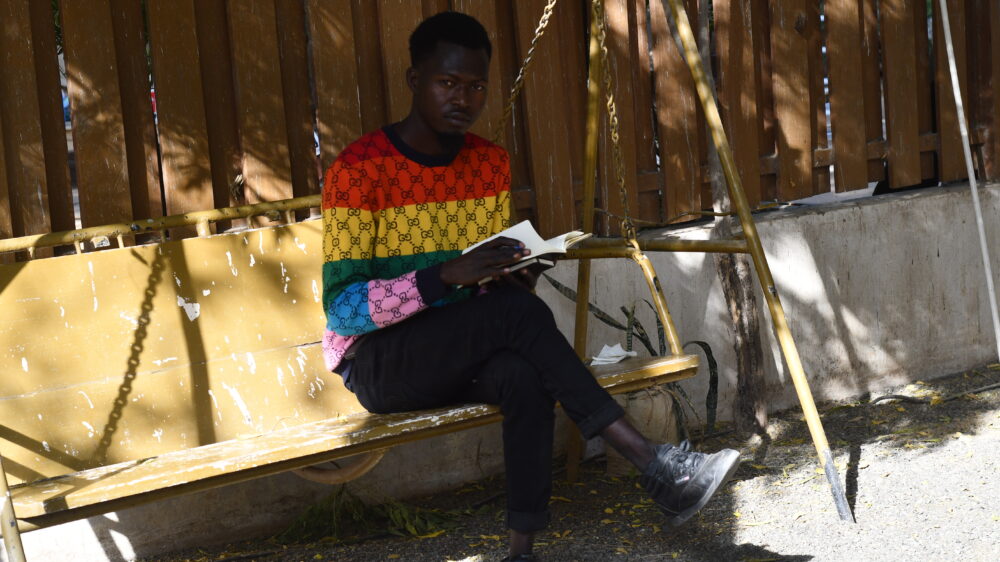
The workshop took place in N’Djamena, Chad from February 20th to 24th, 2023, and was conducted by Moïse Touré and Simon Njami at the Cocac Villa. 22 young creative minds from different backgrounds, including architects, musicians, stylists, entrepreneurs, actors, and more were encouraged to unlock their creative potential through critical thinking, growing their self-awareness and self-confidence, and stimulating their change-making attitude. The creative outcome of these reflections was expressed in a notebook produced by each participant.
Issaka Moussa Bachar, editorial statement from AtWork Catalog.
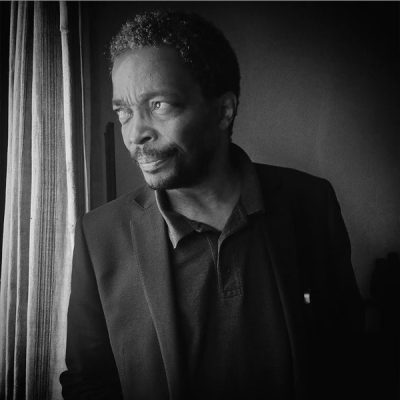
Simon Njami is a Paris-based independent curator, lecturer, writer, and art critic. Njami was the co-founder and editor-in-chief of “Revue Noire“ a journal of contemporary African and extra-occidental art. He has served as artistic director of the Bamako photography biennale for ten years. He co-curated the first African pavilion at the 52nd Venice Biennale in 2007 and curated the first African Art Fair, held in Johannesburg in 2008. He has served for ten years (2000/2010) as a cultural advisor for the AFAA the cultural branch of the French Ministry of Foreign Affairs (today Institut Français) in their cultural cooperation policy. He was a member of numerous art and photography juries (10 years at Worldpress). Njami has curated numerous exhibitions of contemporary art and photography, including Africa Remix (2004-2007) and The Divine Comedy (Frankfurt, Savanna, Washington DC, 2014/15) African Metropolis (MAXXI, Rome, 2018), and two Editions of the Dak’Art Biennale (2016/2018). He was a member of the scientific boards of numerous museums and a Visiting Professor at UCSD (University of San Diego California). He has directed the Pan African master classes in photography (2008/2019), a project that he conceived with the Goethe Institut and he is the advisor of the AtWork educational format that he co-created with Moleskine Foundation in 2012 and continues to conduct until the present moment. He is also currently setting up the permanent collection of contemporary art for the Memorial Acte Museum in Guadeloupe.
Njami has published seven books, including essays and novels.
 Independent and creative, Moïse Touré created the company Les Inachevés in Grenoble. He continues his career in France and abroad. He participated in the implementation, at the Théâtre National de l’Odéon, of the project of Georges Lavaudant with whom he continues an artistic collaboration. He was an associate artist at the Scène Nationale de Guadeloupe, where he laid the foundations for a traveling dramatic repertoire in the Creole language. He was also an associate artist at Bonlieu Scène Nationale d’Annecy, where he implemented “Art and population” projects.
Independent and creative, Moïse Touré created the company Les Inachevés in Grenoble. He continues his career in France and abroad. He participated in the implementation, at the Théâtre National de l’Odéon, of the project of Georges Lavaudant with whom he continues an artistic collaboration. He was an associate artist at the Scène Nationale de Guadeloupe, where he laid the foundations for a traveling dramatic repertoire in the Creole language. He was also an associate artist at Bonlieu Scène Nationale d’Annecy, where he implemented “Art and population” projects.
Traveler, he multiplies artistic collaborations. He sets a common thread: to link the very forms of his work to circumstances and local reactions. It stops in Morocco, Japan, Niger, Bolivia, Mali, Brazil, Senegal, Portugal, and Greece. By bringing in his luggage texts by Marguerite Duras, Jean-Paul Sartre, Bernard-Marie Koltès, Jean-Marie Gustave Le Clézio, and Jean Racine he works a lot as a screenwriter. He was a member of the national mission “Cultural action for republican integration” and in this context, he created and performed on national territory and internationally Claude-Henri Buffard’s play La Minute de Silence. He created and broadcast from 2006 to 2008 in France and Africa 2147, Africa with choreographies by Jean-Claude Gallotta and Seydou Boro, and original music by Rokia Traoré. He takes up the subject of this show 10 years later the creation of 2147, what if Africa were to disappear? In 2011, a new perspective opened up for Moïse Touré’s artistic adventure with the creation of the Academy of Shared Artistic Knowledge and Practices (intergenerational) with the first founding act, the implementation of the Trilogy project for a dialogue of the continents: Europe (France) / Africa (Burkina Faso) / Asia (Vietnam) – Duras, our contemporary through the writings of the author. In 2020, he questions the notion of hospitality with the founding act of the creation of La nuit sera calme, with texts by Jacques Derrida and Anne Dufourmantelle as starting materials. This theme will guide the work of the company Les Inachevés until 2023.
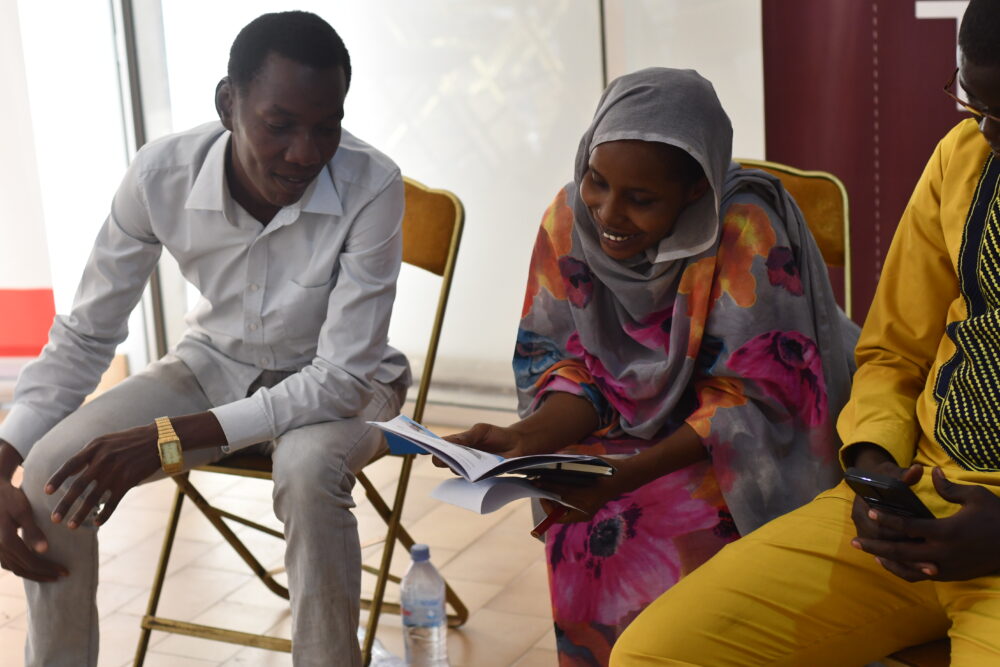
We were present for the second time in N’Djamena. We made a first attempt to host the workshop last October but had to postpone it due to civil unrest due to political tension in the country. The participants began the workshop with an open mind and heart, ready to dig deep to understand ‘What Comes First?’ to them as social animals. At first, it was surprising to witness this openness considering the cultural context that we were in.
However, we quickly understood through our discussion that Chad’s youth agents are composed of individuals who are devoted to the well-being of their communities and the progress of their country as a whole. This shared atmosphere brought the group very close in a short amount of time. We had the opportunity to benefit from a successful workshop due to their values as individuals and community-driven attitudes.
Other than the workshop, these participants were able to attend and benefit from additional cultural experiences such as Simon Njami’s press conference at the French Institute, where he gave personal insights on his interpretation of the theme of the workshop.
Ahmat Aboulaye Malick, the curatorial statement from AtWork Catalog
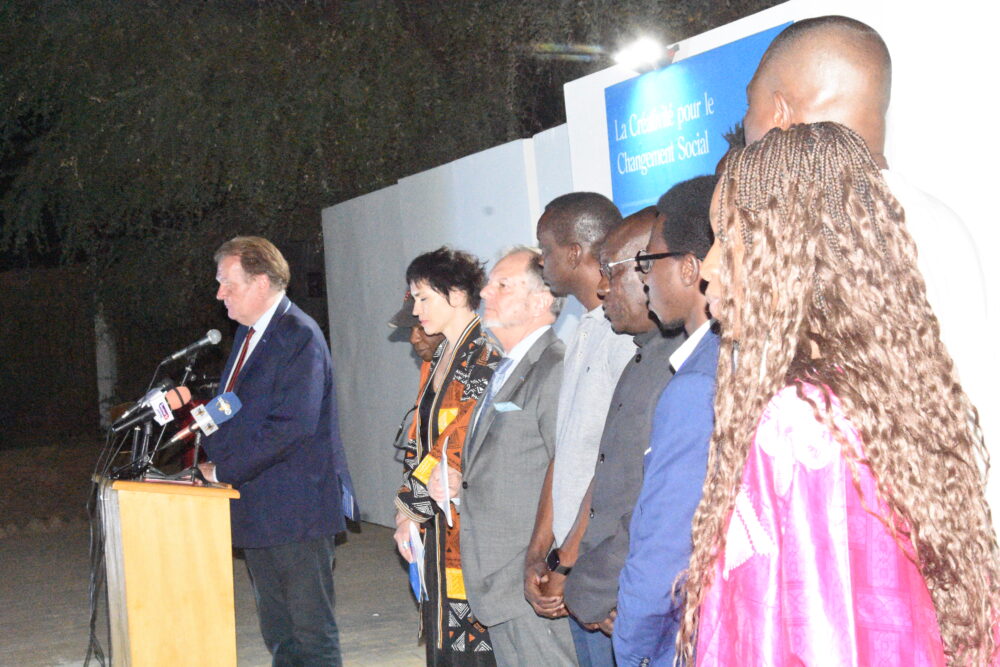
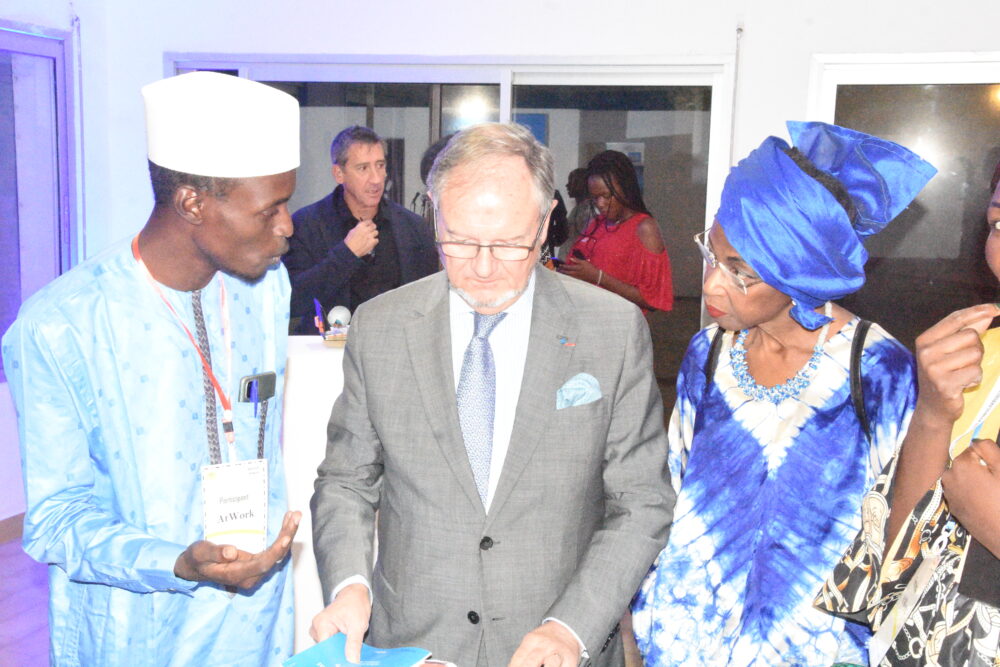
The Moleskine notebooks created by the participants during the workshop have been exhibited at the Cocac Villa. The exhibition was co-curated by the workshop participants under the supervision of Simon Njami and Moise Touré. It was inaugurated on February 27th and will run until late March. A special catalog featuring the interpretation of the theme “What Comes First?” and the related notebooks of all the participants have been produced by the participants themselves in 48 hours.